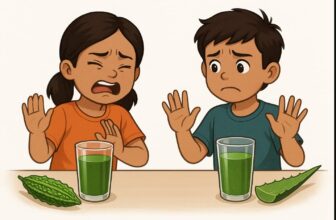The Indian kitchen is full of diverse ingredients that form the foundation of our daily meals. While many of these foods are nutritious and wholesome, some can be harmful if not handled properly. From nuts to vegetables, it’s important to be aware of the toxic foods that may lurk in your kitchen and the precautions you should take. Here are 9 such foods to be cautious about, using regional names for better relatability.
9 Common Toxic Foods Found in Indian Kitchens:
1. Aflatoxin Contaminated Nuts (Mungfali, Badam, Kaju)
Risk: Nuts such as mungfali (peanuts), badam (almonds), and kaju (cashews) can be contaminated by aflatoxins, toxic compounds produced by molds like Aspergillus flavus. These toxins can cause liver damage and are carcinogenic in high amounts.
Solution:
- Always purchase nuts from reputable stores.
- Store nuts in airtight containers in a cool, dry place, away from sunlight.
- If you find any mold or unusual spots, discard the nuts immediately.
- Choose fresh, unexpired nuts to reduce the risk of contamination.
2. Potatoes with Green Patches (Aloo)
Risk: Aloo (potatoes) with green patches contain solanine, a toxin that can cause nausea, dizziness, and headaches.
Solution:
- Always inspect potatoes before using them. If you see green spots, cut those parts away and discard them.
- To avoid solanine formation, store potatoes in a cool, dark place away from light.
- If potatoes have sprouted, remove the sprouts and discard the potato if it looks unhealthy.
3. Raw Jackfruit Seeds (Kathal)
Risk: Kathal (jackfruit) seeds contain cyanogenic glycosides, which can release cyanide when consumed raw, leading to food poisoning.
Solution:
- Always cook jackfruit seeds thoroughly. Roasting or boiling them helps neutralize the toxins.
- Avoid eating raw or undercooked jackfruit seeds.
- If you’re preparing a dish with jackfruit, make sure the seeds are properly cooked and tender.
4. Uncooked Kidney Beans (Rajma)
Risk: Rajma (kidney beans) contains phytohaemagglutinin, a toxin that can cause severe gastrointestinal distress if not properly cooked.
Solution:
- Always soak rajma in water for at least 6-8 hours or overnight.
- Boil the soaked beans in fresh water for at least 10 minutes at high temperatures to neutralize the toxin.
- Never eat raw or undercooked kidney beans. Ensure they are soft and fully cooked before consumption.
5. Tamarind with Black Spots (Imli)
Risk: Imli (tamarind) that has black spots or appears moldy can contain mycotoxins, which can cause digestive issues and liver problems.
Solution:
- Inspect tamarind carefully before use. If it has any black spots or signs of mold, discard it immediately.
- Use fresh tamarind or store it properly in an airtight container to prevent contamination.
- If the tamarind is overripe, avoid using it in recipes.
6. Rats and Pest-contaminated Grains (Chawal, Atta, Dal)
Risk: Improperly stored grains like chawal (rice), atta (wheat flour), and dal (lentils) can attract rodents and insects, which introduce harmful bacteria and toxins.
Solution:
- Store grains in sealed, airtight containers to prevent contamination by pests.
- Inspect grains for any signs of insects or pests before using them.
- If grains are infested, discard them immediately and clean the storage containers thoroughly before refilling them with new grains.
7. High-Mercury Fish (Surmai, Tuna)
Risk: Surmai (kingfish) and tuna are known to accumulate high levels of mercury, which can cause neurological issues when consumed in excess.
Solution:
- Limit consumption of high-mercury fish, especially for pregnant women and children.
- Choose smaller, local fish like pomfret, bangda (mackerel), and rawas that are less likely to accumulate mercury.
- Opt for sustainable and well-regulated seafood sources when possible to ensure lower mercury levels.
8. Canned Food with BPA (Tinned Vegetables, Fruits)
Risk: Many canned foods, such as tinned sabzi (vegetables) and fruit, may contain Bisphenol-A (BPA), a harmful chemical linked to hormonal imbalances and health issues.
Solution:
- Avoid frequent consumption of canned foods and prefer fresh or frozen options.
- If using canned goods, look for BPA-free cans.
- Always check the expiration dates of canned foods and avoid consuming them if the can is dented, swollen, or damaged.
9. Overripe or Moldy Fruits and Vegetables
Risk: Overripe or moldy fruits like seb (apple), gajar (carrot), and leafy greens like paalak (spinach) can harbor harmful mycotoxins, leading to digestive problems or allergic reactions.
Solution:
- Always inspect your fruits and vegetables for any signs of spoilage or mold before consumption.
- If the food item is overripe or moldy, discard it immediately.
- Store fruits and vegetables in the refrigerator or a cool, dry place to prolong freshness.
Closing Thoughts
The foods mentioned above are commonly found in Indian kitchens, but if not handled or consumed properly, they can pose serious health risks. By taking simple precautions—like proper storage, thorough cooking, and avoiding moldy or spoiled ingredients—you can safeguard yourself and your family from these toxic foods. Stay vigilant and mindful about your food choices to ensure a healthier kitchen environment.
Stay safe, and always prioritize food safety in your kitchen!





